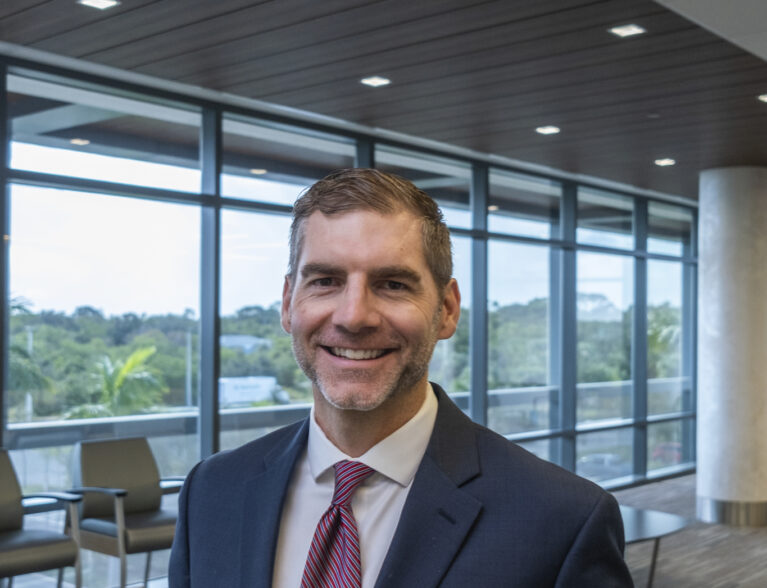
Whether it is due to excess rich food, extra alcohol, excitement, the holiday blues or simply stress, Christmastime can lead to a cardiac condition known as “holiday heart.”
Studies have shown that the winter holiday season is associated with a significant increase in cardiac deaths. In fact, the top three days for heart attacks are Dec. 25, Dec. 26 and Jan. 1. These episodes are unaffectionately dubbed by doctors as the ‘Merry Christmas Coronaries’ and the ‘Happy New Year Heart Attacks.’
“Typically holiday heart refers to the association of alcohol with a rhythm disorder called atrial fibrillation (AFib),” said Dr. Christopher Trotter, cardiologist with Cleveland Clinic Indian River Hospital. “A single alcoholic beverage can double the risk of atrial fibrillation episode within just a few hours. Two or more alcoholic drinks in one sitting can actually triple the likelihood of AFib.
Additionally, overeating, lack of sleep and stress can also contribute to Holiday Heart Syndrome.”
Atrial fibrillation is the most common heart rhythm disorder. It’s an irregular heart rhythm that often may be found with no symptoms at all. The American Heart Association estimates that over 5 million Americans are living with AFib today and more than 12 million people are projected to have AFib by 2030. AFib affects about 10 percent of Americans aged 65 or older and is more common in individuals under the age of 65 than previously thought.
Normally, your heart pulses to a regular beat but in AFib the upper chambers of the heart, or the atria, beat irregularly. Because not enough blood is being pumped out of the atria, blood pools in the area and can form a blood clot. If that clot is pumped out of the heart to the brain, it blocks the blood supply to the brain and causes a stroke. 15 to 20 percent of stroke victims have this heart arrhythmia.
Left untreated, AFib doubles the risk of heart related deaths and increases the risk of stroke fivefold.
“The biggest problem with AFib is that is goes undetected,” said Dr. Trotter. “The risk of stroke with atrial fibrillation can increase as much as 15 percent per year, dependent on an individual’s risk factors. When symptoms do develop, they often include palpitations or heart racing, chest pain, shortness of breath, nausea, lightheadedness, cold sweats or an ongoing odd or funny feeling in the chest.”
There is good reason why more heart attacks occur during the winter holiday season.
The holidays bring unique triggers that increase the risk of holiday heart syndrome. Alcohol consumption tends to increase during festivities. Rich salty foods can elevate blood pressure and place additional strain on the heart. And the emotional stress of gatherings, travel or end-of-year pressures can lead to surges in adrenaline, further destabilizing the heart’s rhythm.
Disruption of regular exercise and sleep routines are other contributing factors. Seasonal behaviors create a perfect storm for cardiac stress, particularly for those with undiagnosed heart conditions.
“Like an orchestra the human body has many instruments that each have their own specific timing function and rhythm that are all related to one another,” Dr. Trotter explained. “Rhythms of your blood pressure, your sleep, your body temperature, your dietary nutrition, your emotional stress and even your memories are all synced.
“When it comes to the holidays, changes in your external environment change the natural rhythm of the body and disrupt the body’s internal balance, making you more prone to a heart attack.
You are eating and drinking more, you have more excitement and emotional stress, and it throws off the timing of everything. Christmas and New Years are big events, and we know those can offset those rhythms and predispose to heart attacks.”
Awareness is the key to avoiding the unwelcome gift of holiday heart.
“You can minimize your risk of a holiday heart attack by modifying and treating known risk factors like high blood pressure, smoking, diabetes, dyslipidemia and even getting your flu shot,” Dr. Trotter said.
“Keep your distance from a fire as there is some data on smoke inhalation from wood-burning fireplaces and bonfires being a trigger. Get plenty of exercise, maintain good sleep habits, and avoid overindulgence in foods and alcohol. Try to reduce stress and avoid anger. Instead, practice mindfulness and gratitude and focus on the priorities your life like faith, family and friends.”
If you do feel that your heart is racing around the holidays, and it’s not just from seeing someone underneath the mistletoe, but due to irregularity, or you’re feeling short of breath, having any type of chest discomfort or feeling overly fatigued, you need to seek medical attention.
Doctors can sort out symptoms of an emergency cardiac condition with diagnostic tests. Once diagnosed, treatment focuses on restoring blood flow and stabilizing the heart rhythm, which may involve medications like beta-blockers, blood thinners or nitroglycerin, and surgical procedures.
Holiday heart syndrome is an important reminder of the delicate balance required to maintain good heart health, even during times of joy and celebration. While the holidays provide an opportunity to connect with loved ones and create lasting memories, they also underscore the importance of moderation and self-care. Try to enjoy the holiday season while still practicing heart healthy habits.
Dr. Christopher Trotter received his medical education at St. Matthews University School of Medicine-Cayman Islands in Orlando, and completed his residency in Internal Medicine at the Internal Medicine Residency Program in Charleston, West Virginia. He went on to complete cardiology and interventional cardiology at Baylor Scott and White Medical Center in Temple, Texas. He is an interventional cardiologist with offices at the Rosner Family Health and Wellness Center at Cleveland Clinic Indian River Hospital. For more information or an appointment call 877-463-2010.



